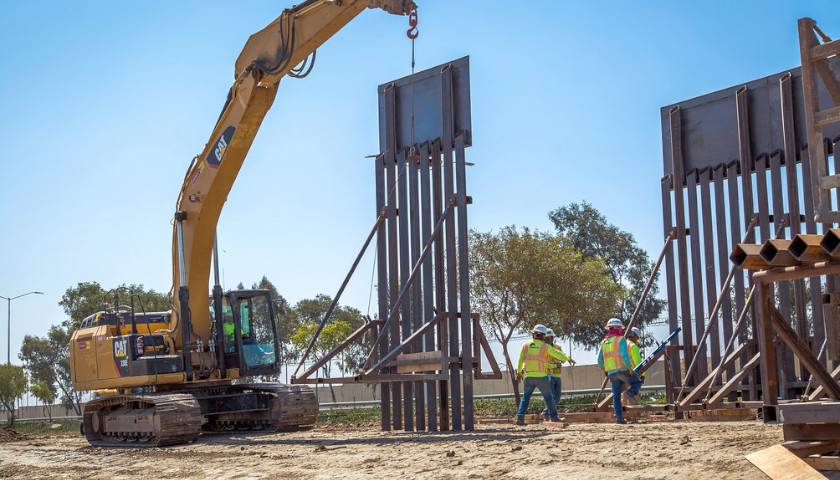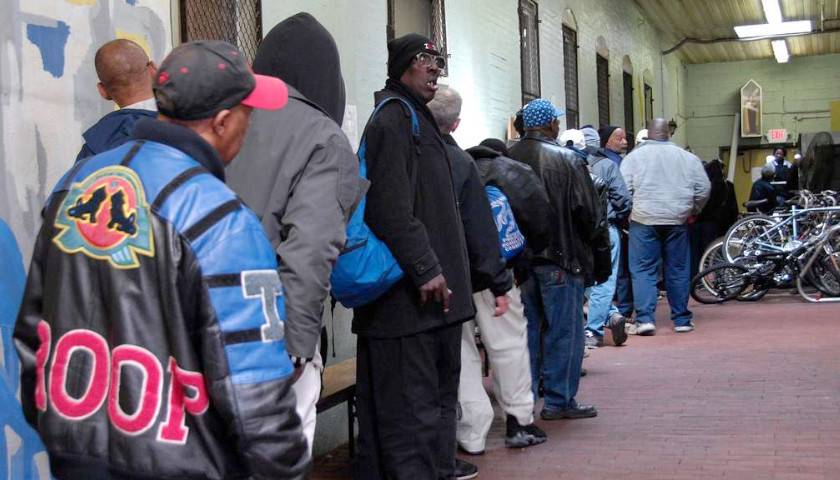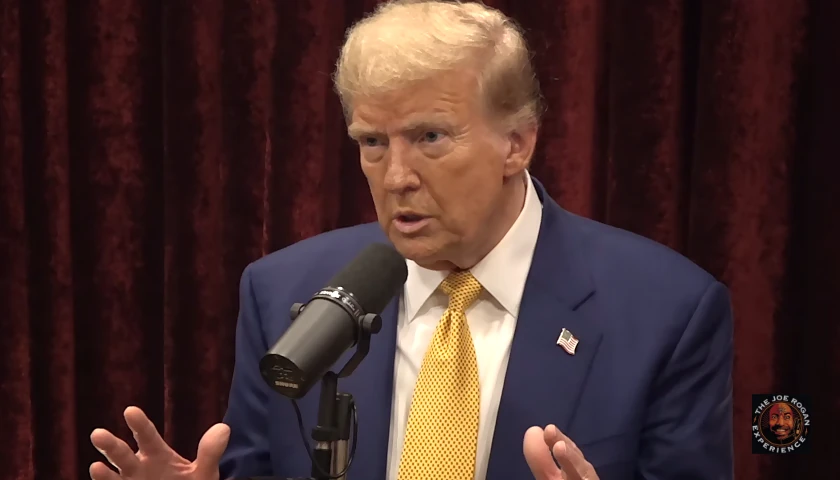by Ben Whedon
Former President Donald Trump broke onto the political stage in 2015 with a promise to build a wall along the nation’s southern border with Mexico, highlighting the security risks of a porous border and calling to limit entry into the U.S.
Nearly nine years later, his potential return to the White House may hinge on similar issues, with exit polls from early primaries and key political allies suggesting the border remains of paramount importance to the electorate.
Trump recently cruised to victory in both the Iowa Caucus last week and the New Hampshire Republican primary on Tuesday evening, seemingly positioning himself to sweep key primary states and claim the party nomination. In the case of the latter contest, exit polling from multiple outlets suggested that immigration ranked among top voter concerns, even in a constituency far removed from the surge in illegal crossings from Mexico.
Forty-one percent of New Hampshire Republicans chose immigration as their top priority in a Fox News voter analysis, compared with 31% who picked the economy. Exit surveys from CBS News and CNN discovered similar voter sentiment. Potentially driving that sentiment is the deteriorating situation at the frontier under Department of Homeland Security Secretary Alejandro Mayorkas, whom Republicans have mulled impeaching over his handling of the matter.
“Our thorough and fair investigation exposed Secretary Mayorkas’ abuse of power and refusal to comply with the law,” House Homeland Security Committee Chairman Mark Green, R-Tenn., said Wednesday. Under Mayorkas’s tenure, U.S. Customs and Border Protection (CBP) has consistently reported record numbers of illegal border crossings, including nearly 2.5 million in fiscal year 2023 alone.
Speaking on the “Just the News, No Noise” television show, pollster John McLaughlin conceded that New Hampshire shares a border with Canada that has served as an entry point for drug smugglers, a point that could impact Granite State perception of the issue. He did, however, assert that the situation had not deteriorated “to the extent of the southern border. But it’s still I mean, the Biden administration is totally derelict in enforcing the borders.”
“And President Trump raised it in 2016, the country embraced it,” he went on. “The powers that be in Washington that survive off exploiting the middle class and allowing illegal immigrants into the country, they didn’t embrace it. And now, there’s more of a backlash.” McLaughlin further highlighted Trump’s New Hampshire victory, contending that Trump managed to overcome significant non-Republican support for former U.N. Ambassador Nikki Haley by consolidating the Republican vote, which he attributed in part to Haley’s own record on the border.
“We fought through that…President Trump got three quarters of the Republican voters because they know that Nikki Haley, at one point had attacked us on the wall, attacked President Trump’s terrorist ban,” he added.
Voters concerns over the situation appear to stretch beyond merely the influx of new persons and extend the consequent drug and human smuggling operations and their impact. Pollster Scott Rasmussen told the John Solomon Reports podcast that voters had observed a link between the border situation and a litany of other issues, such as national security and the Fentanyl crisis.
“[P]eople are connecting the border crisis with the Fentanyl crisis. They are seeing weaknesses in national security that connects the border problem to what’s happening in the Middle East or Ukraine. There’s some general fears that are going on,” he said. “When you have phenomenon like black Democrats suing their city over the migrant crisis, that’s something that tells you this is a huge issue.”
“And I think one of the one of the reasons it’s a big issue is the political elites don’t see it as a big issue and many Democrats want to propose a solution that would would not please most voters,” Rasmussen continued. “And so all of a sudden, you’ve got the situation that the Democratic Party is having a hard time grappling with. Nothing is being done. And it’s it’s moving up as a decisive issue. When you talk about the economy, it’s always like a number one or two issue, almost always number one, but the things they say are bothering them aren’t as clear cut as they are on border security.”
Trump national spokeswoman Liz Harrington concurred with Rasmussen and suggested the campaign planned to highlight the links between the border crisis and other issues facing the nation.
“I think the border is certainly all those issues. But the border in particular is going to be a big one. I think [Trump]’s going to hit on some of the trafficking issues as well, drug trafficking, human trafficking, because I mean, people don’t remember he was so strong on this issue with executive orders,” Harrington said on the same podcast. “And we had the strongest border. And it made a lot of powerful people, not very happy. But he’s going to do it again. And I think he’ll speak to a lot of those issues because the border is so encompassing.”
“It’s not just the economy, that it affects, obviously, the rule of law. That is our fundamental sovereignty, but the drugs, our enemies, what they’re doing, being able to do with a wide open border, it is an invasion,” Harrington continued. “It is such a travesty, what’s going on right now. But I think that’s going to be a big part of his speech. But all those core issues, I mean, he is able to lay out a vision unlike any other other person, and because not only does he have a track record to prove he can get things done and be successful, and all these fundamental issues. But he has even better ideas, more ways to give the power back to the people. I think that’s ultimately what it’s all about.”
Former acting CBP Commissioner Mark Morgan, for his part, contended that rising voter awareness and concern over border-related issues stemmed largely from the situation deteriorating to the point that the public cannot avoid noticing its adverse effects.
“I think that what we’ve been saying for a very long time, you know, one of the phrases is ‘every state is a border state,'” he said on the “Just the News, No Noise” television show. “Yeah, I think people are finally waking up across this country. And I think we’re at a point now to a level that if you’re being intellectually honest, there’s no more denying it.”
“We have Democrats now are even admitting the crisis now they’re called-for solution is very different than what we really need,” Morgan went on. “But nevertheless, there’s a widespread acknowledgement… people understand what’s happening at our border is an absolute chaos. This unsustainable and there has to be change. And I think that’s what you’re seeing reflected in the polls.”
In an upcoming episode of the John Solomon Reports podcast, former Speaker of the House Newt Gingrich, R-Ga., stated bluntly “[t]he fact is, the American people are fed up.”
“When you have a school evacuate all of its American students in order to bring in illegal immigrants because the weather is so bad, you can’t keep them in a tent camp, people just know there’s something profoundly wrong,” he said. “When the mayor of Chicago announces, ‘all of our shelters are full’ and yet there are more people coming across the border every day, something is profoundly wrong.”
Chicago has been a self-proclaimed “sanctuary city” for more than 38 years.
“We just did a poll at [America’s New Majority] and something like 78% of the American people are deeply opposed to non citizens voting. And they get it. And they understand that about a similar percentage is opposed to amnesty,” Gingrich went on. “And, of course, the whole process on the left is to have no borders, no control, allow everybody to come in the country, allow them to vote, even if they’re not citizens. And this is the road to disaster.”
– – –
Ben Whedon is an editor and reporter for Just the News. Follow him on X.




